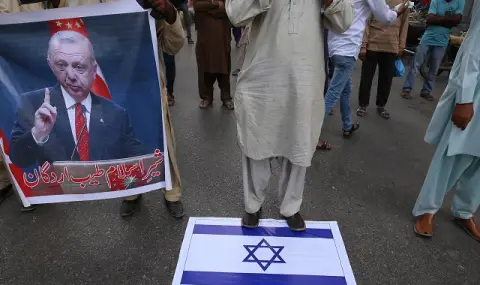Exploration of textbooks in Saudi Arabia found increased progress in the kingdom in the presentation of Israel and Zionism, continuing the positive trend of recent years, reports "Times of Israel".
Textbooks for the 2023-2024 school year no longer claim that Zionism is "racist" European movement and does not deny the historical Jewish presence in the region. This is according to the study published last week by the non-profit organization IMPACT-se, which examines the educational programs in the countries of the Middle East and North Africa.
"This is a small step that shows a change in the narrative towards Israel and demonstrates more tolerance and openness," said Nimrod Goren, who heads Mitvim - Israel's Institute for Regional Foreign Policy.
The designation of Israel as an "enemy state" has been deleted, but references to the "Israeli occupation" can still be found, and the curriculum still emphasizes Saudi Arabia's commitment to the Palestinian cause.
The report notes that the name "Israel" it still does not appear on maps, but the name "Palestine", which used to cover all of Israel's territory, has now been removed.
"This shows that if the Saudis are moving towards normalization, they are doing everything in line with the UAE and Bahrain model,'' Goren added, referring to the diplomatic ties established with the two Gulf monarchies under the 2010 Abraham Accords. Mr.
Relations with the UAE and Bahrain have turned into cultural cooperation and contacts between peoples, the so-called A "warm peace", as opposed to the "cold peace" established with Jordan and Egypt - two countries where public opinion is extremely antagonistic towards Israel.
Saudi Arabia's gradual opening began about a decade ago, Goren added. "The process resembles what the UAE and Bahrain were doing in the decade before the Abraham Accords - a very slow, gradual move that reflects the tolerance and normalization of engagement, making it more routine in terms of public perception," he elaborated.
"The UAE, for example, played the card of religious tolerance with the construction of Abraham's family house,'' Goren added, referring to a building including a mosque, church and synagogue in the UAE's capital, Abu Dhabi, opening in 2023. ;It was an easy entry point to show a better perception of Israelis and Jews.
Promoting religious tolerance appears to be the path followed by Saudi rulers to prepare public opinion for a possible new chapter in relations with Israel.
A study of Saudi textbooks found that anti-Semitism has been virtually eradicated from the kingdom's curriculum. In recent years, Saudi students have been exposed to incredible examples of hate and incitement in textbooks, the report noted. "Examples that have since been removed include the characterization of Jews as treacherous individuals and verses from the Koran that teach that Jews have turned into apes.
Problematic content promoting violent jihad and martyrdom has also been removed in recent years, the report added. Instead, a nonviolent interpretation of jihad is promoted as an individual struggle for personal growth, as opposed to an armed struggle against non-Muslims.
Some of the most dramatic changes in Saudi Arabia's attitude toward Israel have occurred in the religious sphere and in relations with the Jewish world, after a delegation of American Jews visited the kingdom in 2022 and Israeli Communications Minister Shlomo Karhi held a prayer service in Riyadh days before October 7.
In addition, in 2022, Mohammad bin Abdulkarim Al-Isa, the Saudi secretary general of the Muslim World League and former minister of justice in the monarchy, led a Muslim delegation to the Auschwitz concentration camp.
Moves toward normalizing relations with Israel, however, should not be seen as an abandonment of the Palestinian cause, an issue that still stirs strong emotions among much of the Saudi public. The kingdom has repeatedly issued critical statements during Israel's ongoing war against "Hamas" and has emphasized its support for Palestinian civilians.
Last week, in perhaps its sharpest statement against Israel since the outbreak of war, the Saudi Foreign Ministry accused Israel of carrying out "continued genocidal massacres" after an Israeli strike in Rafah that killed dozens of civilians.
Over the years, Saudi Arabia has shown it is willing to soften what it has asked of Israel in exchange for establishing diplomatic ties. While the Arab Peace Initiative presented in 2002 spoke of the creation of a Palestinian state as a precondition for normalization, the talks held last year before October 7 referred to a "path" towards the creation of a Palestinian state or "irreversible steps".
"This is a completely different quest in the name of normalization," Goren pointed out. However, Prime Minister Benjamin Netanyahu has so far refused to commit to a credible path to a future Palestinian state as part of normalization talks.
